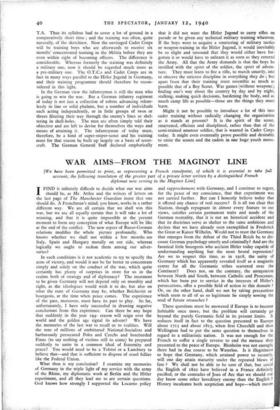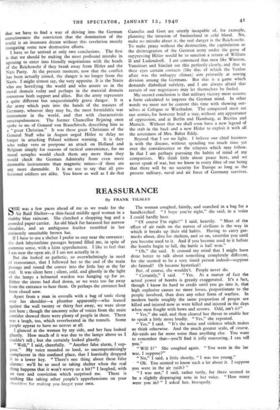WAR AIMS-FROM THE MAGINOT LINE
[We have been permitted to print, as representing a French standpoint, of which it is essential to take full account, the following translation of the greater part of a private letter written by a distinguished French diplomat now serving in the Maginot Line] IFIND it infinitely difficult to decide what our war aims should be, as Mr. Attlee and the writers of letters on the last page of The Manchester Guardian insist that one should do. A Frenchman's mind, you know, works in a rather different way. We are all certain that we shall win this war, but we are all equally certain that it will take a lot of winning, and that it is quite impossible at the present moment to form any conception of what Europe will be like at the end of the conflict. The new aspect of Russo-German relations modifies the whole picture profoundly. Who knows whether we shall not within a few months see Italy, Spain and Hungary morally on our side, whereas logically we ought to reckon them among our adver- saries?
In such conditions is it not academic to try to specify the aims of victory, and would it not be far better to concentrate simply and solely on the conduct of the war, which quite certainly has plenty of surprises in store for us in the realms both of strategy and of diplomacy? The treatment to be given Germany will not depend only on morality and right, as the ideologues would wish it to do, but also on what the state of Germany may be, whether Bolshevist or bourgeois, at the time when peace comes. The experience of the past, moreover, must have its part to play. So far, unfortunately, I have only succeeded in drawing negative conclusions from this experience. Can there be any hope that suddenly in the year 194- reason will reign over the world and the golden age signal its advent? We have the memories of the last war to recall us to realities. Will the tens of millions of embittered National-Socialists and barbarously persecuted Poles and Czechs and bombarded Finns (to say nothing of victims still to come) be prepared suddenly to unite in a common ideal of fraternity and peace? You would need to be a Tolstoi or a Lansbury to believe that—and that is sufficient to dispose of cruel follies like the Federal Union.
What then is my conclusion? I examine my memories of Germany in the triple light of my service with the army of the Rhine, my diplomatic work at Berlin and the Hitler experiment, and all they lead me to are certain questions. God knows how strongly I supported the Locarno policy and rapprochement with Germany, and I continue to regret, for the peace of my conscience, that that experiment was not carried further. But can I honestly believe today that it offered any chance of real success? It is all too clear that Nazism, though repugnant in almost every feature to our views, satisfies certain permanent traits and needs of the German mentality, that it is not an historical accident and that its doctrines serve as shelter to the same ambitions and desires that we have already seen exemplified in Frederick the Great or Kaiser Wilhelm. Would not to trust the Germany that emerges from the defeat of the Third Reich be to dis- count German psychology utterly and criminally? And are the fanatical little bourgeois who acclaim Hitler today capable of understanding anything but the most brutal repression? Are we to respect this time, as in 1918, the unity of Germany which has apparently revealed itself as a magnetic centre for all the Germanic tribes scattered over the Continent? Does not, on the contrary, the antagonism between North and South, between Catholic and Protestant, which has been put to service in the interests of Hitler's persecutions, offer a possible field of action in this domain ? Or, on the other hand, shall we not by taking precautions which seem to all of us so legitimate be simply sowing the seed of future revanches ?
These questions must be answered if Europe is to become habitable once more, but the problem will certainly go beyond the purely Germanic field in its present limits. It reduces itself in fact to the question presented to Europe about 1715 and about 1815, when first Churchill and then Wellington had to put the same question to themselves in regard to a militaristic nation. It was not enough for the French to suffer a single reverse to end the menace they presented to the peace of Europe. Blenheim was not enough; there had in due course to be Waterloo. Is it illegitimate to hope that Germany, which attained power so recently, will one day attain maturity under the repeated blows of fate ? We shall not be able to be sure of that, but could the English of 182o have believed in a France definitely pacified, or the comrades of Joan of Arc that we should one day know some other hereditary enemy than the English ? History inculcates both scepticism and hope—which means that we have to find a way of driving into the German consciousness the conviction that the domination of the world is an insensate dream without this revelation merely instigating some new destructive efforts.
I have so far arrived at only two conclusions. The first is that we should be making the most profound mistake in agreeing to enter into friendly negotiations with the heads of the Reichswehr if they break away from Hitler and the Nazi Party. At the present moment, now that the conflict has been actually joined, the danger is no longer from the Nazis. I might almost say, the very opposite. It is the Nazis who are horrifying the world and who assure us in the moral domain today and perhaps in the material domain tomorrow both support and allies. But the army represents a quite different but unquestionably grave danger. It is the army which puts into the hands of the masters of Germany, whoever they may be, the most formidable war instrument in the world, and that with characteristic unscrupulousness. The former Chancellor Briining once spoke to me of General von Brauchitsch, describing him as a " great Christian." It was these great Christians of the General Staff who in August urged Hitler to delay no longer in attacking Poland without warning. It is they who today veto or postpone an attack on Holland and Belgium simply for reasons of tactical convenience, for no moral scruples would check them any more than they would check the German Admiralty from even more damnable instruments than magnetic mines—if there are any more damnable. It is no use to say that all pro- fessional soldiers are alike. You know as well as I do that Gamelin and Gort are utterly incapable of, for example, planning the invasion of Switzerland in cold blood. No, make no mistake about it, the real danger is the Reichswehr. To make peace without the destruction, the capitulation or the disintegration of the German army under the guise of suppressing Hitler would be to sanction a return of William II and Ludendorff. I am convinced that men like Winston, Vansittart and Sinclair see this perfectly clearly, and that in their eyes certain contacts (like that of which the Venloo affair was the unhappy climax) aim primarily at sowing division among the Germans. But that is a game which demands diabolical subtlety, and I am always afraid that certain of our negotiators may let themselves be fooled.
My second conclusion is that military victory must assume a form calculated to impress the German mind. In other words we must not be content this time with showing our- selves at Cologne or Wiesbaden; The conquered must see our armies, for however brief a stay, without any appearance of oppression, and at Berlin and Hamburg, at Breslau and Munich. Without that we shall soon have a new legend of the stab in the back and a new Hitler to exploit it with all the astuteness of Mrs. Baker Eddy.
Beyond that I see no light. I believe our chief business is with the disease, without spending too much time yet over the convalescence or the relapses which may follow. In that I am perhaps pursuing the habits of mind of my compatriots. We think little about peace here, and we never speak of war, but we know in every fibre of our being that there will be no security for Europe as long as the present military, naval and air force of Germany survives.



































 Previous page
Previous page